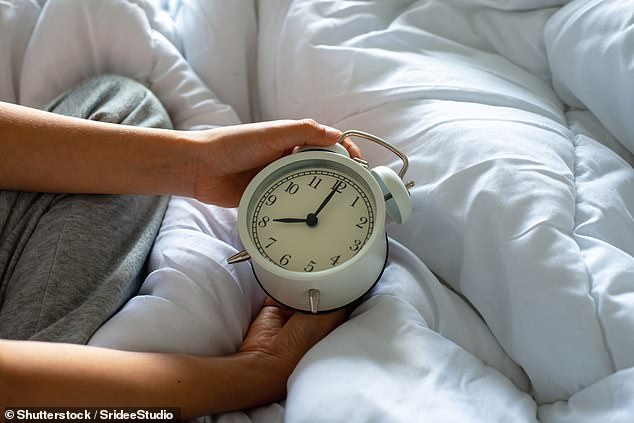It might sound like your worst nightmare.
But wearing socks to bed may be the key to getting a good night’s sleep.
That is according to Martin Seeley, boss of MattressNextDay, who said it ‘can help you fall asleep faster and experience deeper sleep’.
The simple trick gives our internal master-clock, or circadian rhythm, a helping hand.
In the run-up to bedtime, the body slowly winds down its factories and conserves energy — lowering its core temperature.
To do this, the body sends heat from its core to the hands and feet at night.
But having cold feet interferes with this process and ultimately disrupts the sleep/wake cycle.
This is because blood vessels constrict when cold, meaning the body has to work slightly harder to cool down because blood pressure increases.
But warming up the feet dilates the constricted blood vessels, allowing more heat to escape through the skin — causing a drop in temperature.
Mr Seeley said: ‘Wearing socks to bed can help warm up your feet, which can signal to your body that it’s time to sleep.
‘However, whether or not wearing socks to bed actually leads to a deeper sleep can depend on the individual.
‘Some people may find that wearing socks to bed is uncomfortable, while others may not notice any difference in the quality of their sleep.’
Deep sleep, also known as slow-wave sleep or stage 3 of non-rapid eye movement (NREM), is an important stage of the cycle.
Each sleep cycle lasts around 90 minutes, moving from lighter sleep stages to deep sleep.
Experts suggest we should spend 10 to 15 per cent of each night in deep sleep —the recommended amount.
But many people do not reach that all important REM sleep stage for a sufficient amount of time, experts say.
Getting enough deep sleep can prevent hormone imbalances, improve cognitive function and repair and regenerate tissues, muscles, and bones, studies suggest.
Deep sleep also plays a role in regulating emotions, mood, and behaviour.
A 2007 study from the Netherlands Institute for Neuroscience (NIN), published in the journal Physiology & Behaviour, found that people who wore socks in bed managed to get to sleep faster.
Spending less time tossing and turning and trying to fall asleep indicates you’re more likely to experience a deeper, high-quality sleep, according to experts.
But wearing socks to bed is not the only secret Mr Seeley recommends for a satisfying sleep.
Investing in a weighted blanket could help you wake up more energized and in a better mood.
He said: ‘Weighted blankets provide gentle pressure that can help promote relaxation and reduce stress and anxiety.
‘This can help improve the quality of your sleep and increase the amount of deep sleep you get.’
A 2015 study in the Journal of Sleep Medicine & Disorders also found that a weighted blanket helped those with insomnia sleep better, simply because it helped them feel more settled before bed.
Evening sleep-inducting routines should also start hours before bedtime.
Mr Seeley added: ‘Develop a calming routine before bed to help your body and mind relax.
‘This could include taking a warm bath, practising relaxation techniques like meditation or deep breathing, or reading a book.’
Other tips include sticking to a consistent sleep schedule, going to bed and waking up at the same time everyday, even on weekends.
This helps to regulate your body’s internal clock.
Moving more can help you sleep better too.
Regular exercise is not only good for your physical health and your mind, it can also help improve the quality of your sleep, according to Mr Seeley.
However, it’s important avoid vigorous or strenuous exercise near bedtime if it affects your sleep, he noted.










